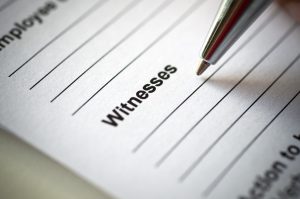 The Supreme Court of New Jersey’s decision in State v. Isaiah J. Knight offers a nuanced examination of the limits of reciprocal discovery in criminal cases, particularly focusing on the circumstances surrounding an affidavit recanting a witness’s previous identification of the defendant as the perpetrator of a crime. The facts of this case play a crucial role in understanding the Court’s rationale and its implications for criminal defense.
The Supreme Court of New Jersey’s decision in State v. Isaiah J. Knight offers a nuanced examination of the limits of reciprocal discovery in criminal cases, particularly focusing on the circumstances surrounding an affidavit recanting a witness’s previous identification of the defendant as the perpetrator of a crime. The facts of this case play a crucial role in understanding the Court’s rationale and its implications for criminal defense.
On June 1, 2021, Tyzier White was fatally shot outside the Neptune Lounge in Newark. Two witnesses, known by the nicknames “Zay” and “DJ Neptune,” identified Isaiah Knight as the shooter based on sworn statements and photo arrays. Subsequently, Isaiah Knight was arrested. However, in December 2021, Zay reported being coerced into recanting his original statement through a written affidavit while being held at gunpoint by individuals, including the defendant’s sister and cousin. This affidavit aimed to exonerate Knight by claiming Zay’s initial identification was made under duress from detectives.
The State sought to obtain this recanting affidavit from the defense, asserting that it constituted physical evidence of crimes (witness tampering and kidnapping) related to the initial murder charge. The defense objected, invoking constitutional protections to resist disclosing the affidavit. Nonetheless, the trial court and later the Appellate Division ruled in favor of the State, compelling the disclosure of the affidavit under the reciprocal discovery rules.
 Hudson County Criminal Lawyer Blog
Hudson County Criminal Lawyer Blog


 In a landmark decision, the New Jersey Supreme Court provided critical insights into the state’s witness tampering statute through the case of State v. William Hill. This case scrutinized the boundaries of lawful communication and witness intimidation, posing significant implications for criminal defense strategies.
In a landmark decision, the New Jersey Supreme Court provided critical insights into the state’s witness tampering statute through the case of State v. William Hill. This case scrutinized the boundaries of lawful communication and witness intimidation, posing significant implications for criminal defense strategies. In a landmark decision, the New Jersey Supreme Court weighed in on a crucial issue of first impression: Must a criminal defendant be provided in-person interpreting services during a jury trial, or will video remote interpreting (VRI) suffice? The case of State v. Juracan-Juracan dives into this question, addressing a major point of contention within the legal community—especially given the significant adjustments courts have had to make in response to the COVID-19 pandemic.
In a landmark decision, the New Jersey Supreme Court weighed in on a crucial issue of first impression: Must a criminal defendant be provided in-person interpreting services during a jury trial, or will video remote interpreting (VRI) suffice? The case of State v. Juracan-Juracan dives into this question, addressing a major point of contention within the legal community—especially given the significant adjustments courts have had to make in response to the COVID-19 pandemic. Attorney Stephen Natoli successfully argued before a three-judge panel that his client’s rights had been violated during a 2019 trial handled by prior counsel. Following the trial, Defendant was sentenced to twenty-three (23) years in prison. He had been serving his prison sentence when he retained Mr. Natoli for his appeal.
Attorney Stephen Natoli successfully argued before a three-judge panel that his client’s rights had been violated during a 2019 trial handled by prior counsel. Following the trial, Defendant was sentenced to twenty-three (23) years in prison. He had been serving his prison sentence when he retained Mr. Natoli for his appeal. Under the Sixth Amendment of the United States Constitution and the laws of New Jersey, suspects are entitled to have an attorney present while they are held in custody for questioning.
Under the Sixth Amendment of the United States Constitution and the laws of New Jersey, suspects are entitled to have an attorney present while they are held in custody for questioning. Three Strikes Laws were adopted in certain jurisdictions to protect the public from habitual offenders who repeatedly commit certain violent crimes. These law typically mandate a sentence of life imprisonment without parole for a third-time offender.
Three Strikes Laws were adopted in certain jurisdictions to protect the public from habitual offenders who repeatedly commit certain violent crimes. These law typically mandate a sentence of life imprisonment without parole for a third-time offender. Witness “impeachment” refers to the process of attacking a witness’s credibility and the accuracy of their testimony at trial. The Federal Rules of Evidence and the New Jersey Rules of Evidence both allow the impeachment of a witness’s credibility by use of their prior convictions. However, when the witness is a defendant testifying in their own trial, there are specific rules that apply to the State’s use of their prior convictions.
Witness “impeachment” refers to the process of attacking a witness’s credibility and the accuracy of their testimony at trial. The Federal Rules of Evidence and the New Jersey Rules of Evidence both allow the impeachment of a witness’s credibility by use of their prior convictions. However, when the witness is a defendant testifying in their own trial, there are specific rules that apply to the State’s use of their prior convictions.
 On December 9, 2021 the New Jersey Appellate Division published a decision which struck down a portion of New Jersey’s terroristic threats statute. In
On December 9, 2021 the New Jersey Appellate Division published a decision which struck down a portion of New Jersey’s terroristic threats statute. In 